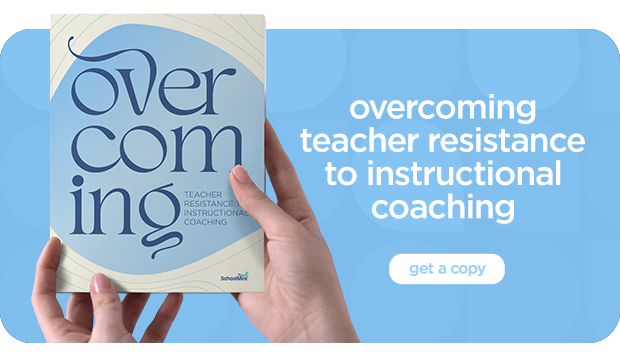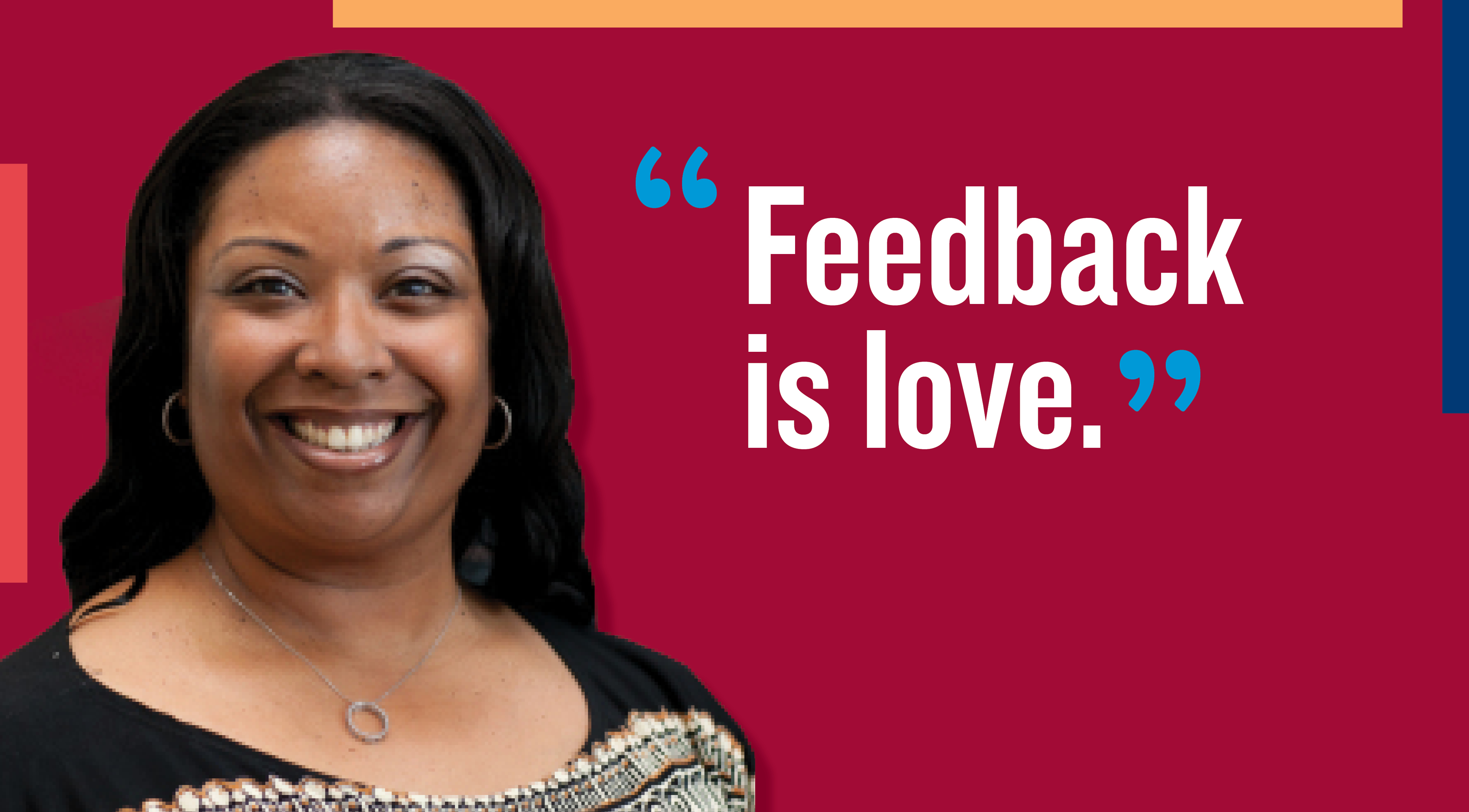Teachers’ Perceptions of Instructional Coaching — Findings May Surprise You
Do you think your teachers don’t want you doing walkthroughs in their classroom? Think again!
Dr. Jennifer Warren had an important question: What is the perception of walkthrough feedback from the teacher’s perspective?
There is limited research on the effectiveness of walkthrough feedback. The research that is available exists primarily from the perspective of school administrators.
 Dr. Warren is an experienced secondary principal who has been serving in education the past 21 years. She has been a third-grade teacher, math coach, assistant principal, elementary principal, and middle school principal. She’s a proud military spouse and mother of two. She has her Doctorate in Educational Leadership and her Master’s in Educational Administration from Tarleton State University. She is a national presenter and mentor to new principals.
Dr. Warren is an experienced secondary principal who has been serving in education the past 21 years. She has been a third-grade teacher, math coach, assistant principal, elementary principal, and middle school principal. She’s a proud military spouse and mother of two. She has her Doctorate in Educational Leadership and her Master’s in Educational Administration from Tarleton State University. She is a national presenter and mentor to new principals.
Read on to learn more about what teachers really think of walkthrough feedback, based on the research Dr. Warren completed for her doctorate in 2014 and her lived experiences as a principal in Killeen Independent School District in Texas.
Table of Contents
Let’s Survey
Dr. Warren created a survey to help find the answer to three important questions. Do teachers believe that walkthroughs:
- Increase their effectiveness in the classroom
- Help inform their professional development
- Improve their classroom instruction
See the responses below. BUT, I recommend you read on to the serendipitous findings of the nearly 300 participants…117 left juicy and interesting comments!
- 74% of teachers strongly agreed or somewhat agreed feedback helps increase effectiveness
- 61% of teachers strongly agreed or somewhat agreed feedback helps provide input for professional development
- 70% of teachers strongly agreed or somewhat agreed feedback helps improve classroom instruction
Serendipitous Findings (...and Reflections from an Expert)
The term serendipity is used in research to describe finding the unexpected, which, when recognized, happily changes the course of the research for good. Comments from 117 survey respondents revealed overwhelming themes.
1. Teachers Want Longer Observations
Teachers say that school administrators don’t spend the time necessary to get a true picture of the classroom. They feel that quick assumptions are being made about the lesson or student behaviors.
Reflections from Dr. Warren:
Dr. Warren struggles just like everyone else to get into the classroom. It doesn't matter where you work; if you’re a school administrator, then you’re BUSY.
However, she says that it’s important to remember that teachers actually want school leaders in their classrooms. If you make the time to give them instructional feedback, then you’re making time for something that helps a teacher to feel supported by their school leaders. The lack of this support, or at least perceived lack, is leading to an exit from education for far too many.
Dr. Warren shared with us a story about a rockstar teacher she knew who was interviewing for a job teaching a new content area. The hiring administrator boasted “we won’t bother you in your classroom at all.”
What that teacher felt was disappointment!
Yes, classroom autonomy is important, but the educators who are going to make a big impact on your students are the ones that want to grow and want your help doing so.
2. Teachers Want Electronic Feedback
Feedback received in software was the overwhelming preference of respondents. Why do they favor electronic feedback? Because of how timely it is.
In terms of the content of that electronic feedback, teachers want fewer checklists and more comments.
Reflections from Dr. Warren:
Frankly, it would be impossible to coach effectively without electronic feedback. We live in 2023, and software is an essential vehicle to getting this information out.
Dr. Warren had teachers share with her that they’ve had school administrators come to their classroom for a walkthrough and then they never received any feedback.
Likely, that school admin got sidetracked in their day and either forgot to give the teacher a paper handout or to transcribe that feedback into an email. Either way, that teacher went home feeling undervalued and confused.
If you’re concerned about a teacher being resistant to an important piece of feedback, then trust your gut! Talk with them 1:1 before providing them with an electronic record of that feedback.
Reflections from SchoolMint:
If you don’t love your coaching software, or are dealing with the headache that is Google Spreadsheets, schedule time with SchoolMint’s experts! The goal of a coaching platform is to make giving feedback more efficient and effective.
Software provides the analytics you need to be more data driven with instructional support: create opportunities for more productive coaching conversations, identify trends, and see where there are gaps in instruction so you know where to invest resources.
3. Teachers Want More Frequent Visits
In addition to the length of time spent on an individual walkthrough, teachers highlighted the frequency of visits as a key differentiator. Teachers feel that like short, infrequent visits result in an inaccurate picture of their classroom. Plus, they say that more frequent visits would help ease nerves, make them feel less threatened, and be more open to observers.
Reflections from Dr. Warren:
One person can’t do it all! If you’re a principal, it may be your instinct to put all of your new teachers on your coaching load. But this is the exact group that needs the most support, and they need it quickly. Lean on your peers: school administrators, campus and district instructional coaches, lead teachers, etc.
You can always come together as a team to discuss individual campus needs and campus-wide trends, leading to the data-driven decision-making necessary to move the ticker on teacher effectiveness.
A key way to ensure those frequent visits from multiple school leaders are perceived well is full transparency with your teachers.
Dr. Warren makes sure teachers know at the beginning of the year what they can expect from her. And she gives them a heads up if she’ll be coming into the classroom.
Reminder: If you aren’t able to get into the classroom consistently, then it does get a little weird! Make appearances when you can to increase teacher comfortability and make walkthroughs feel like part of the norm.
4. Teachers Say That All Feedback is Welcomed
Teachers said positive, critical, and specific feedback were all welcomed. I know what you’re thinking: “They may say this, but do they really want critical feedback?”
YES! A lot of this comes down to the way the feedback is delivered. For example, secondary teachers responded that feedback was more frequently negative and felt like a “gotcha.”
Reflections from Dr. Warren:
We asked Dr. Warren how she responds when she encounters pushback to walkthroughs. She pondered for a moment and then said, “I don’t think I receive any pushback at all.” But how? “By creating a safe and positive environment.”
Dr. Warren is extremely supportive and positive. Feedback can’t be all constructive. You need to show your appreciation for teachers and make sure they know the great things they’re doing in their classrooms are being recognized.
When you are providing constructive feedback, it’s important to keep two key things in mind:
- It’s not about what you’re saying; it’s about how you’re coming off. There is a human being sitting on the other side of that table, so give feedback with grace.
- Get the biggest bang for your buck! Giving a teacher a million things to work on is overwhelming, and telling them to work on something they disagree with just won’t happen. Identify the lowest hanging fruit that will quickly benefit the students in the classroom.
Beyond that, Dr. Warren is so transparent with her teachers at the beginning of the year that walkthroughs are just a part of the culture. So educators don’t think about pushing back on what’s just the campus norm.
The Participants
Dr. Warren reached out to teachers in 95 randomly selected Texas districts (among districts with 20 schools or less). She received participation from 297 educators, 117 of whom left additional comments.
Study participants were…
Contact the Researcher
Dr. Jen Warren is the owner of the small business, Principal Badassery, created to support all educational leaders. If you’re interested in coaching or mentoring, or just want to learn more from a badass educator, check out her website, Principal Badassery.
Recent Posts
Share this
You May Also Like
These Related Stories

How One Instructional Leader Makes Classroom Walk Throughs Meaningful

Digging into Dissatisfaction: How Coaching Helps Teacher Retention


